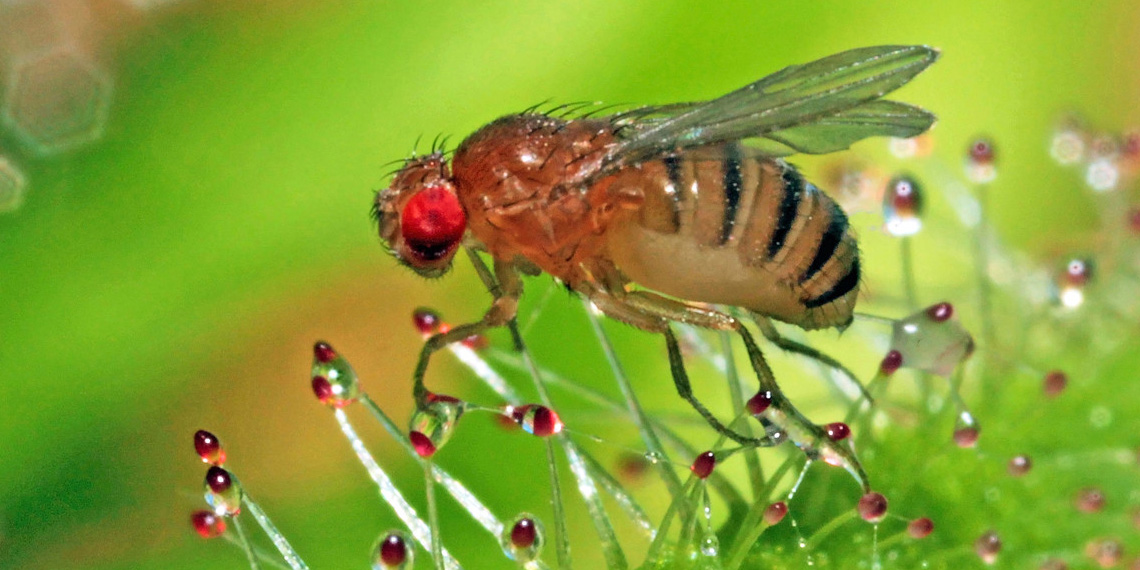
Scientists have taken an important first step into studying the effects of the psychedelic drug psilocybin — the active substance in “magic” mushrooms — at a cellular and genetic level. Their findings, published in Scientific Reports, indicate that a single dose of psilocybin produces a long-lasting antidepressant-like effect in flies.
Psilocybin can profoundly alter the way a person experiences the world by producing changes in mood, sensory perception, time perception, and sense of self. Preliminary research has indicated that combining psilocybin with supportive psychotherapy can result in lasting improvements in patients with major depressive disorder.
The forced swim test is one of the most commonly used animal models to assess antidepressant effects by recording the behavior of rodents facing an inescapable adversity. The authors of the current study adapted the forced swim test for use in Drosophila melanogaster, also known as the fruit fly. The insects have played a pivotal role in genetic research and their neurotransmitter systems are similar to mammalian systems.
“I have been studying fruit flies since my PhD dissertation work, and have looked at the effects of psychedelics and serotonin receptor drugs in them as part of my overall research program ever since,” said study author Charles D. Nichols, a professor of pharmacology at the Louisiana State University Health Sciences Center in New Orleans.
“Serotonin and their receptors in flies are involved in several key behaviors shared with mammals and humans, including many aspects of social interaction, and learning and memory. Fruit flies represent a powerful genetic model to elucidate mechanisms of drug effects and behaviors at the cellular level, and allow for more rapid discovery than in mammalian systems.”
The new study found that repeated doses of the antidepressant medication citalopram reduced immobility in fruit flies during the forced swim test. “This is similar to SSRI effects in humans, where chronic dosing is necessary to produce an antidepressant effect,” the researchers noted.
Psilocybin was also found to have an antidepressant-like effect. A single dose of the psychedelic substance administered several days before the forced swim test reduced immobility.
“The ability of a single exposure to psilocybin to alter neural biology and behavior long-term in a similar manner to SSRI antidepressants indicates that the effects of psilocybin (and likely other psychedelics) are highly evolutionarily conserved,” Nichols told PsyPost. “This means that we can perhaps use fruit flies in rapid and powerful genetic experiments to identify key mechanisms underlying how psilocybin alters behaviors similar to antidepressants. Knowing how psilocybin alters neurobiology at the molecular and genetic level will hopefully lead to development and refinement of the use of psychedelics to treat psychiatric disorders.”
One of the benefits of using fruit flies over rodents is speed. Fruit flies reproduce rapidly and have a short lifespan, allowing for quicker studies. “We previously developed rat models where just one dose of psilocybin has very long-lasting antidepressant-like effects,” Nichols said. “These models are laborious and take several months from start to finish.”
But the use of fruit flies comes with an obvious limitation — the insects are quite different than humans.
“Fruit flies likely don’t get ‘depressed’ (for that matter mice or rats don’t either — depression is a human disorder),” Nichols explained. “We are limited to studying how a drug alters neural physiology relevant to a specific behavior, not a psychiatric condition. For example, the forced swim test in and of itself does not measure a specific behavior seen in humans, but the forced swim test in rodents is highly predictive of antidepressant efficacy in humans. Nevertheless, fundamental processes are conserved, and the study of fruit flies has led to insights into human biology in several areas.”
“Open areas for further research include determining which neurotransmitter receptor(s) are mediating the effects of psilocybin, and if other receptors that activate this target have similar effects, identifying other behaviors in the fly relevant to antidepressant effects in humans that may respond to psychedelics, and finally determining the molecular and genetic mechanisms underlying the effects of psilocybin to alter behaviors relevant to the study of depression in humans.”
“The first author on the study, Dr. Meghan Hibicke, designed and ran the experiments and leveraged her expertise in rodent behavioral pharmacology and models of depression to make this study a success,” Nichols added.
The study, “Validation of the forced swim test in Drosophila, and its use to demonstrate psilocybin has long-lasting antidepressant-like effects in flies“, was published June 15, 2022.
"lasting" - Google News
July 19, 2022 at 09:11PM
https://ift.tt/P1nhm8B
A single dose of psilocybin has long-lasting antidepressant-like effects in fruit flies - PsyPost
"lasting" - Google News
https://ift.tt/OQDyZut
Shoes Man Tutorial
Pos News Update
Meme Update
Korean Entertainment News
Japan News Update
Bagikan Berita Ini














0 Response to "A single dose of psilocybin has long-lasting antidepressant-like effects in fruit flies - PsyPost"
Post a Comment